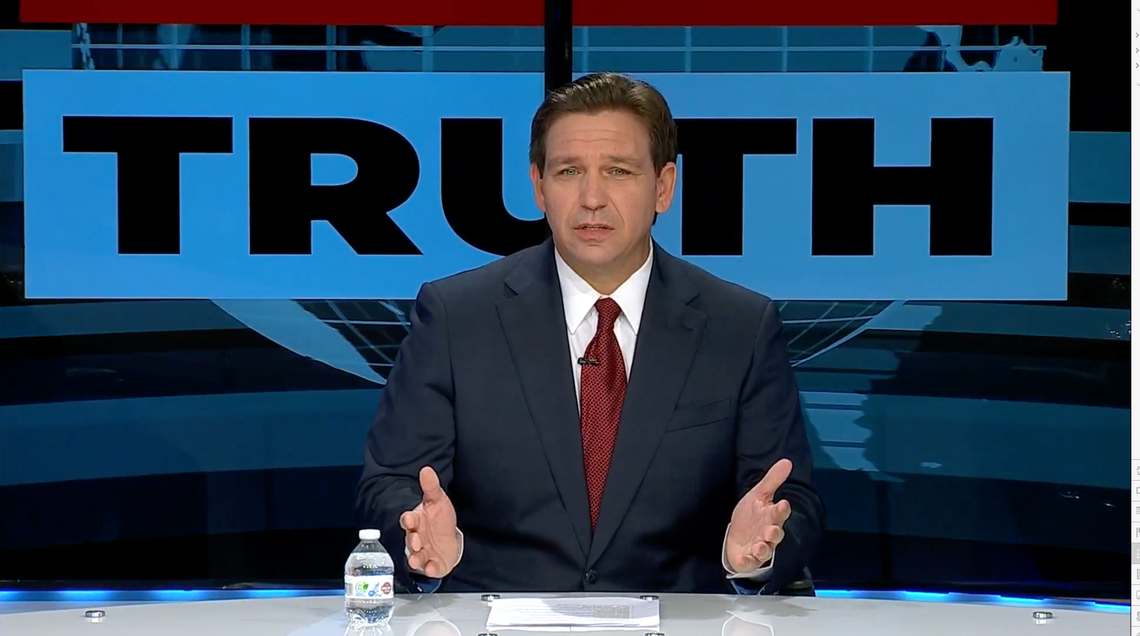Legislation DeSantis wanted to make it easier to sue for defamation appears to be dead
Gov. Ron DeSantis’ goal of passing legislation that would rewrite federal defamation law and make it easier to sue critics appears dead for the legislative session, but the author of the bill said he will be back to try it again next year.
“There’s just not enough time, and I have too much stuff on my plate,’’ said Rep. Alex Andrade, R-Pensacola, the House sponsor of HB 991 as lawmakers approach the final week of the annual 60-day that ends May 5. The companion measure, SB 1220, is also dead, he said, as time ran out before the bills could be heard in their final committees.
The bills would have removed many of the legal protections against defamation lawsuits established in the landmark 1964 Supreme Court case New York Times v. Sullivan by changing what is considered a public figure in a defamation claim and eliminating the longstanding protections for the news media in its coverage of politicians, government officials and public figures.
Although the measure was a top priority for DeSantis, who has been sued for curbing First Amendment protections for critics of his policies in Florida, support for the measure had waned.
For weeks, free speech advocates, including some members of conservative media, warned that the bill was a direct violation of the free speech protections in the U.S. Constitution and would open the door to a barrage of lawsuits, including against conservative talk radio hosts.
The death of the bill is one of the few policy losses the governor has faced this legislative session, as he has advanced an aggressive agenda of culture wars aimed at imposing state controls over classroom speech, transgender healthcare, entertainers in drag, abortion and loosening restrictions on guns.
DeSantis set the stage for the bill
The governor first called for the legislation at a Feb. 7 roundtable event in which he sat in a mock cable news set with a panel of commentators who had sued legacy media companies, such as Fox News and The Washington Post.
Seated in an anchorman’s chair in front of a screen with the words “Speak Truth” behind him, DeSantis declared that “legacy media” companies “are probably the leading purveyors of disinformation in our entire society,” and urged legislators “to be standing up for the little guy” against them.

But instead of protecting average citizens, opponents said the measure would instead serve to protect those in power from criticism by journalists and the public.
James Schwartzel, the owner of 92.5 FOX News, a Fort Myers-based radio station that carries conservative personalities such as Glenn Beck, Sean Hannity, and Mark Levin, wrote legislators to warn the bill would be “the death of conservative talk throughout the state of Florida.”
Congressman Cory Mills, a conservative Republican from New Smyrna Beach, sent a letter to House Speaker Paul Renner, R-Palm Coast, and Senate President Kathleen Passidomo, R-Naples, outlining a litany of objections, including that it will “target speech based on content” and “tilt the playing field in favor of plaintiffs.”
Bobby Block, executive director of the First Amendment Foundation, called the bill a “death knell” that will be used to “try to crush critics of government policy.”
What the bill would have done
The measure would have removed from legal defamation claims Florida’s existing protections of “journalist’s privilege.” That law allows journalists under most circumstances to refuse to identify anonymous sources or disclose other information gathered as part of their reporting.
The bill also would have made using anonymous sources more difficult by assuming that statements from anonymous sources are false in defamation proceedings. If a journalist used an anonymous source, that would also be considered sufficient for showing actual malice, the standard used to establish defamation.
Andrade and Sen. Jason Brodeur, R-Orlando, filed the bills but the governor’s office had hopes that its thrust would extend beyond Florida.
A memo from the governor’s office obtained by the website, Seeking Rents, showed that the bill was designed to set up a legal challenge to New York Times v. Sullivan, the precedent-setting US. Supreme Court ruling that established the standard for defamation claim against media organizations.
“To the extent these provisions conflict with existing Supreme Court precedent, this legislation aims to invite challenges to such precedent with the goal of restoring the original understanding of the First Amendment,’’ the DeSantis legal memo read.
But when legislators came under fire for supporting the bill, DeSantis, who has made antipathy toward “corporate media” part of his campaign narrative, never engaged with legislators about how to address the pushback.
With less than a week left of the legislative session, the sponsors dropped the bills.
“I am encouraged that it appears lawmakers have decided to take time and study the matter further,’’ Block, of the First Amendment Foundation, said Wednesday.
Andrade says he’ll revive the bill in 2024
The opposition by conservative media outlets served at least one purpose, Andrade said.
“Their opposition blew the liberal claim, that this was a partisan bill, out of the water,’’ he said. “ “Working to fix a problem in our civil justice system shouldn’t have ever been considered a partisan issue. It’s not a partisan issue, it’s just a good policy.”
He plans to file the bill again next session. “We’ll be able to start from a much better position next year because of the work we put in this year,’’ he said.
Barbara Petersen of the Florida Center for Government Accountability, a non-profit transparency watchdog, questions why Andrade wants to bring the measure back.
“A bad bill this year will be a bad bill next year,’’ she said.
Mary Ellen Klas can be reached at meklas@miamiherald.com and @MaryEllenKlas
